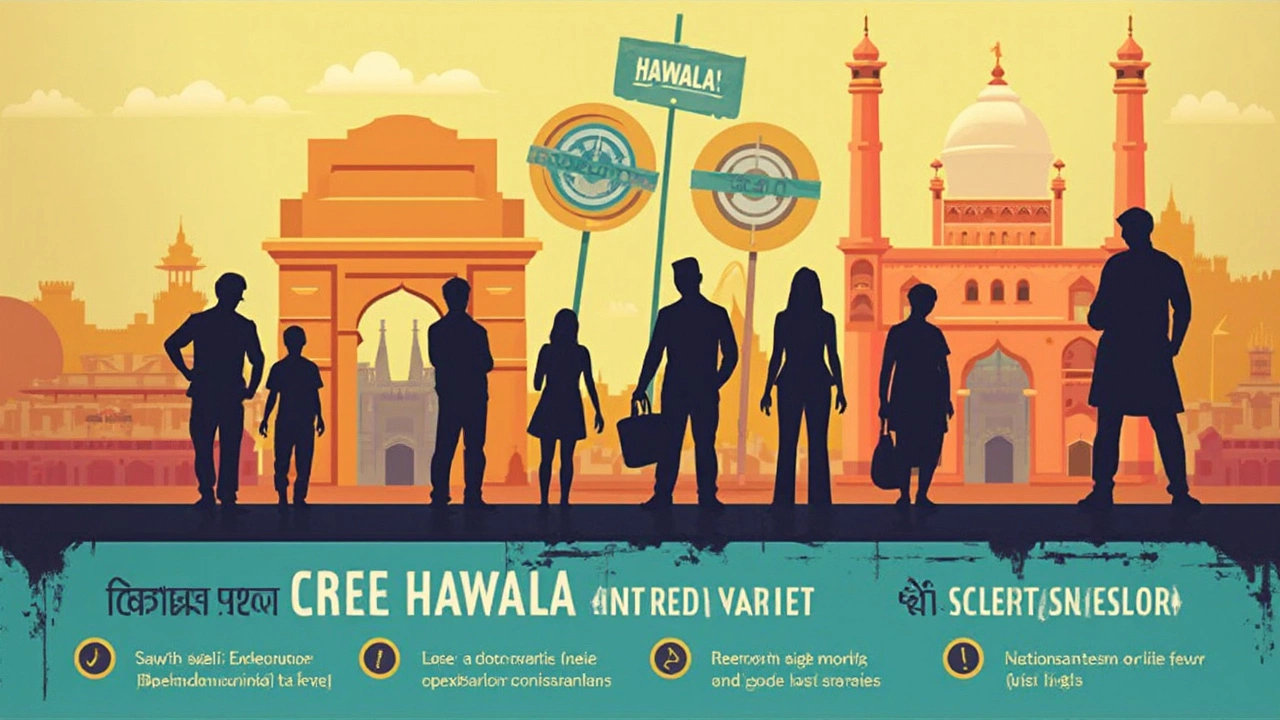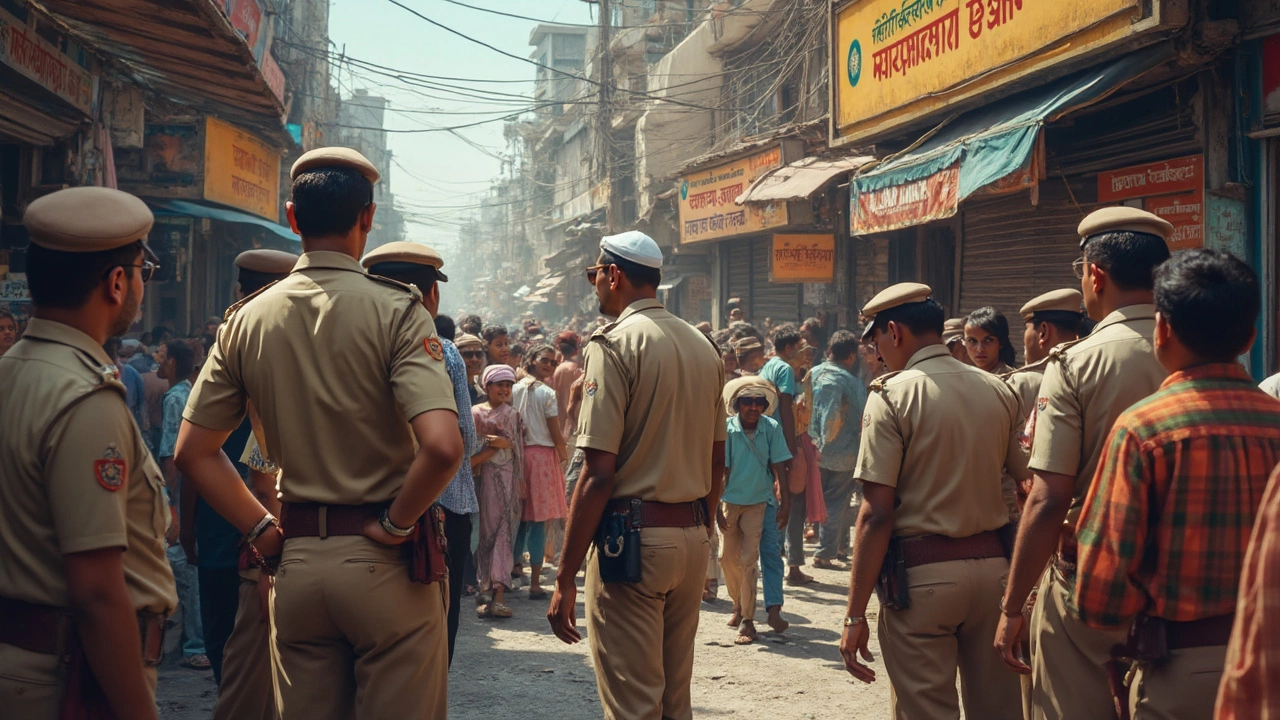If you’ve ever overheard someone talk about “Hawala” money in India, you’re probably curious how risky it really is. Unlike regular bank transfers, Hawala is an informal way of moving cash—no paperwork, no tracking, all underground. Most people stumble into it through a friend or business deal, not always realizing it’s a legal minefield.
The penalty for getting tangled in a Hawala transaction isn’t a slap on the wrist. We’re talking about actual jail time, major fines, and your bank accounts getting frozen. Indian authorities like the Enforcement Directorate and Income Tax Department treat Hawala like a red flag for money laundering, terror funding, and tax evasion. If they find you linked to Hawala—by accident or not—they won’t just let it go.
Laws under FEMA (Foreign Exchange Management Act) and PMLA (Prevention of Money Laundering Act) set strict limits. Even being involved in just one Hawala deal can put you in a legal mess for months, sometimes years. There’s no “I didn’t know” defense—so it’s not something to take lightly.
- Hawala: The Basics You Need to Know
- How Indian Law Sees Hawala
- What Happens If You Get Caught?
- Real-Life Cases and Lessons
- Why It Matters and What to Watch Out For
Hawala: The Basics You Need to Know
Let’s cut through the mystery. Hawala is basically an unofficial money transfer system—no banks, no receipts, just trust and word of mouth. It started centuries ago, mainly for people who needed to send money across borders fast, to places with no formal banking system. Today, it still pops up in India and among the Indian diaspora, especially when someone wants to avoid paperwork or official fees.
How does it work? Say you want to send money from Delhi to Dubai without using your bank. You give cash to a local hawala operator here. He calls his partner in Dubai, who hands over the same amount to your person over there. No money actually travels across countries—it’s all based on a handshake.
Hawala punishment India laws exist largely because the government can’t watch these transactions. That means tax gets dodged, scams can slip through, and authorities have zero record of where the cash ends up. It’s perfect for illegal stuff like bribery, smuggling, or even funding criminal activities. Recent data from the Enforcement Directorate shows that over ₹4,000 crore got seized in Hawala crackdowns in just two years.
- No ID checks, bank slips, or official paper trails—just names and trust
- Hawala networks are international—stretching from Mumbai to London, or Patna to Kabul
- Completely banned by Indian law, even if you claim you “didn’t know”
Authorities often stumble on Indian money laundering laws violations while chasing other crimes and end up busting entire Hawala networks. The main problem? It keeps money invisible and out of the legal system, making things tough for honest folks and the government alike.
How Indian Law Sees Hawala
Indian law does not take Hawala lightly. This is because moving money outside the regular channels isn’t just about breaking rules—it often connects to bigger issues like tax evasion, smuggling, and even worse, funding illegal activities. The government has cracked down on Hawala punishment India because of how easy it is to hide black money through this system.
Two main laws target Hawala in India:
- FEMA (Foreign Exchange Management Act, 1999): FEMA makes it illegal to transfer money in and out of India without going through authorized channels. If you’re caught using Hawala, authorities can freeze accounts, seize assets, and start legal action—even if it was just for one transaction.
- PMLA (Prevention of Money Laundering Act, 2002): This law is even stricter. It treats any money moved through Hawala as part of “money laundering” and, if found guilty, you can face serious jail time and heavy fines. The Enforcement Directorate is the main watchdog under this Act.
The Income Tax Department also joins the party. If you’ve received or sent money via Hawala, they presume you’ve evaded taxes by hiding income. Even if you say you didn’t know, that excuse won’t fly in court. Authorities go after everyone involved—the sender, receiver, and even the so-called agents.
Want some numbers? According to a report from 2023 by the Ministry of Finance, authorities seized over ₹800 crore worth of assets linked to Indian money laundering laws violations, much of it tied to Hawala channels.
The bottom line: Indian law considers Hawala a criminal offense. Whether you’re a business owner or just someone helping a friend, getting caught can turn your life upside down—and officials love making examples out of people who think they’ll never get caught.

What Happens If You Get Caught?
Getting caught in a Hawala punishment India case is messy, fast. No warning, no easy outs. If authorities, like the Enforcement Directorate or Income Tax Department, find out you’re involved in a Hawala transaction, they usually raid your home or office with proper warrants. It’s not just a quick trip to the police station.
The law in India is clear: Hawala is banned under the Foreign Exchange Management Act (FEMA), and if it’s linked to things like money laundering, the Prevention of Money Laundering Act (PMLA) kicks in. Here’s what might unfold if you get caught:
- Investigation and Arrest: Once a case is filed, expect questions about every bit of your money flow. If officers believe you're central to a Hawala ring, you can get arrested on the spot. Bail is tough, especially under PMLA.
- Seizure of Assets: Authorities can freeze your bank accounts, attach your property, and take your assets—even cars and jewelry—if they link them to illegal funds.
- Legal Proceedings: A case moves to court. You’ll need a good lawyer. Trials for Indian money laundering laws take time, and courts often deny bail until they finish their investigation.
If you’re found guilty, punishments are stiff. Under FEMA, you might face:
- Up to three years in jail
- Fines up to three times the amount involved in the transaction
- Permanent disqualification from running a business, if you have one
PMLA penalties are even harsher, with jail time stretching up to seven years for serious money laundering. If Hawala money is tied to terrorism, the Unlawful Activities (Prevention) Act (UAPA) can add more years and even stricter action.
| Law | Jail Time | Fine |
|---|---|---|
| FEMA | Up to 3 years | 3x transaction amount |
| PMLA | 3-7 years | As decided by court |
| UAPA (if linked to terrorism) | More than 7 years | Seizure of property |
There’s no shortcut or “settling” a Hawala case with a bribe; agencies track these transactions seriously, especially after 2016 when stricter monitoring rolled out. Even small amounts can land you in big trouble, so stay far away from Hawala if you value your freedom and finances.
Real-Life Cases and Lessons
Plenty of people think Hawala is a quick fix to avoid taxes or send money abroad, but headlines in India tell a different story. Here’s how it actually pans out when authorities catch someone breaking Indian money laundering laws through Hawala.
Take 2022, for example. Delhi’s Enforcement Directorate (ED) busted a massive Hawala racket moving over ₹3,000 crore. Dozens of suspects ended up behind bars, and investigators even found links to illegal betting rings. The ED and Income Tax Department worked together, freezing accounts and seizing assets worth crores.
Another headline-making case was the 2018 crackdown in Mumbai’s Zaveri Bazaar. Here, Hawala operators were moving cash for jewelers, trying to dodge GST. Raids led to immediate arrests under the PMLA and FEMA, with some traders losing licenses and businesses overnight. The authorities made it clear: they’re not messing around.
Check this out—below is a quick snapshot of what happens to people caught in Hawala punishment India cases:
| Year | City | Money Involved | Outcome |
|---|---|---|---|
| 2022 | Delhi | ₹3,000+ crore | Multi-year jail terms, accounts frozen |
| 2018 | Mumbai | ₹1,000 crore | License canceled, big fines, arrests |
| 2016 | Kolkata | ₹600 crore | Assets seized, ongoing trial |
The pattern is always the same: If the authorities catch a Hawala deal, they shut it down hard. Long court battles, frozen money, and public shame follow. Even relatives can get investigated if their names show up in transactions.
Here’s the takeaway: If someone offers you a Hawala deal, it’s not just about saving money. You could lose everything—from your bank balance to your reputation. It’s just not worth the risk under Indian money laundering laws.

Why It Matters and What to Watch Out For
When you hear stories about Hawala punishment India, it’s easy to brush it off as something that only big criminals deal with. But authorities don’t always target just major players; even regular people can get caught if they’re part of any suspicious money transfers. That’s why knowing what counts as a red flag is a big deal.
Indian law considers Hawala a direct threat to the economy and national security. Money moving through these unofficial channels can fuel illegal activity, tax evasion, and even terrorism. Yep, those are big words—but the laws were made tough for a reason. In 2024 alone, the Enforcement Directorate busted over 200 Hawala networks across several cities, freezing assets worth more than ₹1,200 crore. That shows just how seriously the government polices these deals.
Here’s what you should actually look out for, so you don’t land on the wrong side of Indian money laundering laws:
- If someone offers you a “quick” way to send or receive large sums without bank paperwork, be careful. No paperwork is a classic Hawala sign.
- Unusual payment requests for business or personal deals, especially from unknown contacts or overseas connections, are big red flags.
- If you hear about high commissions or someone promising to “manage” big cash moves outside banks—walk away.
- Don’t share your bank details or ID with anyone claiming to “handle foreign transfers” off the books.
Staying away from deals that sound too good to be true is your best bet. If you’re ever pushed to join something that feels shady, check twice and ask trusted people—sometimes you avoid a lifelong headache with just one phone call.
| Year | Hawala Cases (Ed Raids) | Assets Frozen (₹ Crore) |
|---|---|---|
| 2022 | 150+ | 950 |
| 2023 | 180+ | 1,050 |
| 2024 | 200+ | 1,200 |
The bottom line: it’s risky, and there are no shortcuts. If you want to stay clear of trouble under FEMA and the Prevention of Money Laundering Act, always use official banking channels for any money movement. That extra step saves a lot more than just time—it keeps your name off government watchlists.


